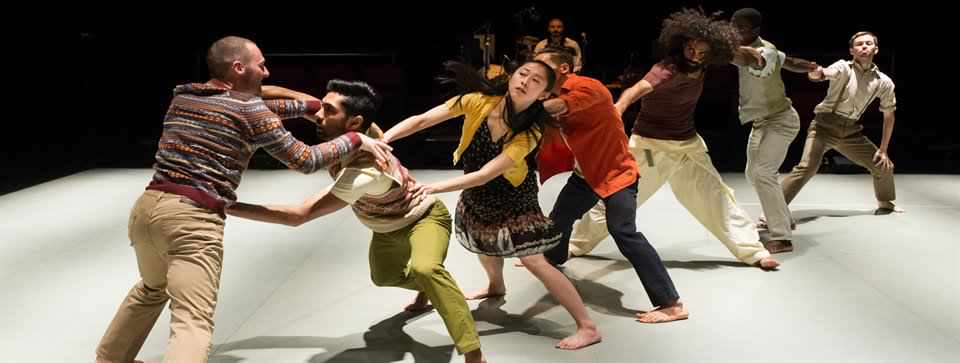Border Tales is a revision of the same work performed in 2013, becoming an even more relevant and powerful commentary in today’s socio-political climate.
Seven male and two female performers of various shapes, sizes, skin colours and ethnicities put individual social experiences under the spotlight, reliving them in a magnified state on stage. British dancers Temitope Ajose-Cutting, Kenny Wing Tao-Ho and Andy Gardiner perform alongside Taiwanese Yuyu Rau, Irishman Stephen Moynihan, and Egyptian Salah El Brogy. Their experiences all revolve around the theme of what happens when cultures collide.
Border Tales begins disappointingly stereotypical, but as it continues to unpack this theme, the stereotypes become real and are made increasingly uncomfortable by this powerful parody. Spoken word takes as much prominence as contemporary dance in the piece, and the performers express themselves with a depth of tone and clarity verbally whilst dancing, without sacrificing anything from either discipline. The work looks at how people interact when addressing their cultures and identities: the reading and reception of well-intentioned interactions that go horribly wrong; the isolation and displacement of people from their homes and identities; and the inquisitive nature of human beings versus fear and ignorance. It explores a complicated society in which love and fear coexist, where good intentions are thwarted by ignorance, and where fear and tension is real. The legitimacy of these tensions are questioned and the frustrating hypocrisy of our own social interactions and relationships starkly highlighted.
Steve and Andy (as they introduce themselves), perform a charming duet whilst having a chat about their friendship. This pas de deux inventively explores all the ways in which one can support the other in sitting positions that frame their speaking times. They describe their differences whilst balancing and supporting each other in turn. There is a defensive duet where partner work is missed or avoided, trialling interactions looking for common ground, finally settling in a handshake. Salah receives a barrage of questions on the body like bullets. He twitches and isolates as the invisible words ricochet off him. Some knock him over or spin him around as he bats them away with his elbows. Kenny appropriates motifs mimicking a beckoning Japanese cat called maneki-neko. This is reclaimed as a Chinese lucky cat in popular culture and used here in an act of appropriating stereotypes in order to conform to expectations.
The clichés bought out in characterisation and speech penetrate the choreography, drawing on a range of styles from twerking divas to a stylised Japanese Geisha fan dance taught on stage. These stylistic choices embellish the grounded contemporary dance technique. The musical score also draws form traditional styles from associated countries, layering expectations on top of the far more complex identities of the individual performers. By performing text with dance, the emotional responses to the themes are physically communicated in a gut-wrenching way that stuns an excited and chattering audience into quiet reflection.
Border Tales is a cultural satire that causes viewers to reflect on the current and future political climate and their own reactions to it. It explores the social ramifications of our current reactive political landscape. A looming Brexit, the continuing presence of terrorism, alongside an erratic American presidency, make this work incredibly important in reminding us not only to fight to keep a multicultural society, but to make that society a better home for us all.
Protein’s Border Tales is running until 26th August at Dance Base alongside three other shows presented by The Place, London at four venues across Edinburgh, as part of the Edinburgh Festival Fringe 2017.

